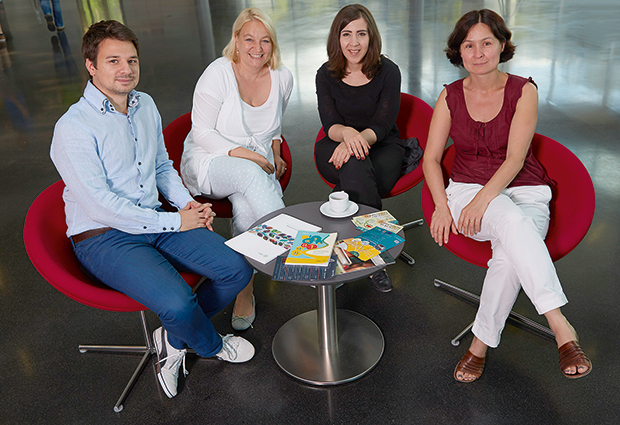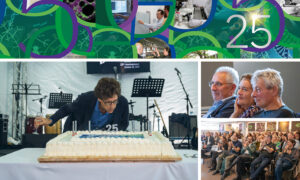
Meet the Dean
Graduation ceremonies feel like the bright light at the end of a long and challenging journey – the culmination of an incredible rollercoaster of research, teamwork, and personal development.

But each time a celebration takes place at EMBL, behind the scenes the hard work is continuing apace – Helke Hillebrand and her team are laying out the bricks and mortar of the internal training programme – home to more than 500 PhD students, postdocs, undergraduates, and interns across EMBL’s five sites.
“Fellows are a crucial part of the academic community at EMBL, and have a tremendous impact on research, innovation, and campus life,” says Hillebrand, who is EMBL’s Academic Coordinator and Dean of Graduate Studies. “Our job is to provide a framework for that success, so that they can develop, collaborate and succeed. This includes screening and recruitment, advice and mentorship, and building connections with some of the best universities in Europe.”
The defining identity of the internal training programme will always remain: small group sizes, close mentorship, academic freedom, collaboration and collegiality, as well as a good dose of social activities, which make EMBL a unique place in which to learn and develop.
The ferns that line the windowsill of Hillebrand’s office hint towards her research background, plant science, where before joining EMBL almost seven years ago she worked in research coordination, technology management and financial communication, focussing on scientific innovation. These experiences, she says, mirror the internal training programme’s emphasis not only on academic success, but communication, teamwork and innovation. “One of the most challenging aspects of a scientific management role is the need to wear a plethora of hats in parallel – all of a sudden you are required to be a teacher, fundraiser, supervisor, spokesperson, mentor and sometimes all of these at once,” she explains. “Whether in academia, industry, or other, these are important skills to develop, and can be continuously improved.”
No day the same
One day the team might be facilitating training courses, strengthening ties with other academic institutions, supporting fellows in their independent planning of symposia or retreats, or organising events such as EMBL’s Career Day. The next could involve spreading word of the programme at career fairs, negotiating contract extensions, writing grants, consulting with group leaders on academic or administrative topics, working with faculty towards defining the strategies for the future of the programmes, or providing individual support to fellows.
One of the most challenging aspects of a scientific management role is the need to wear a plethora of hats in parallel.
“Fellows are highly motivated, inquisitive, intelligent and are ambassadors of their cultures and countries,” she explains, pointing to a list of alumni destinations that reads like an encyclopaedia of scientific careers. “One challenge is to adapt and respond as science evolves and to continue to provide an environment best suited for preparing fellows for their next move. But the defining identity of the internal training programme will always remain: small group sizes, close mentorship, academic freedom, collaboration and collegiality, as well as a good dose of social activities, which make EMBL a unique place in which to learn and develop. Our offices are always open, and it is a privilege to contribute to the rich academic experience on our campuses, working with talented and inspiring young people from all over the world.”


